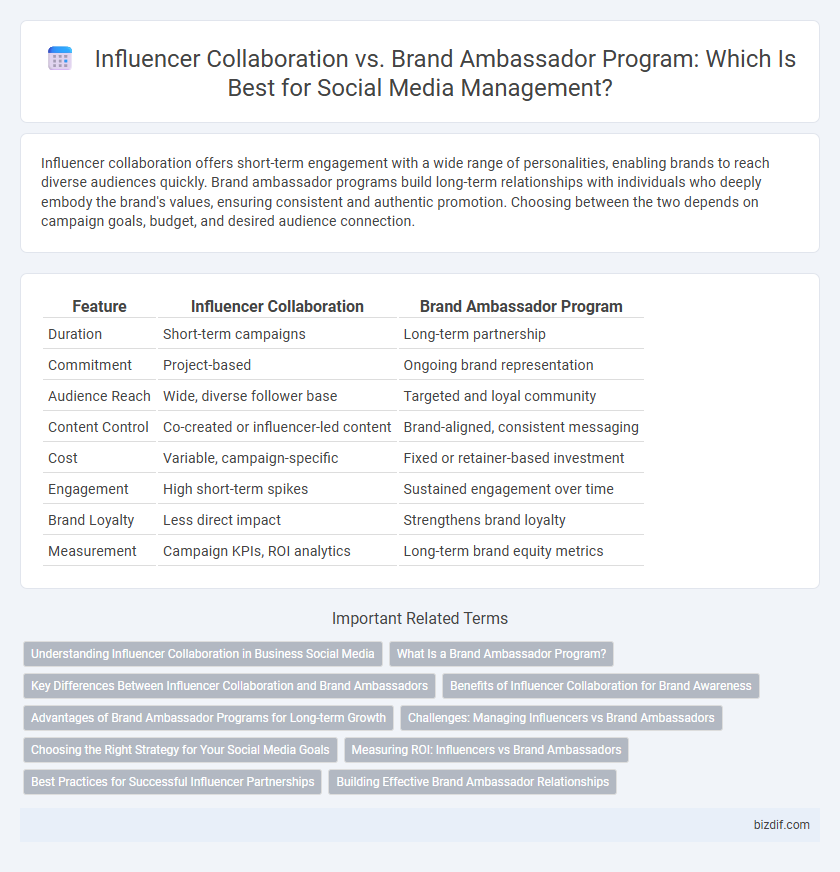Influencer collaboration offers short-term engagement with a wide range of personalities, enabling brands to reach diverse audiences quickly. Brand ambassador programs build long-term relationships with individuals who deeply embody the brand's values, ensuring consistent and authentic promotion. Choosing between the two depends on campaign goals, budget, and desired audience connection.
Table of Comparison
| Feature | Influencer Collaboration | Brand Ambassador Program |
|---|---|---|
| Duration | Short-term campaigns | Long-term partnership |
| Commitment | Project-based | Ongoing brand representation |
| Audience Reach | Wide, diverse follower base | Targeted and loyal community |
| Content Control | Co-created or influencer-led content | Brand-aligned, consistent messaging |
| Cost | Variable, campaign-specific | Fixed or retainer-based investment |
| Engagement | High short-term spikes | Sustained engagement over time |
| Brand Loyalty | Less direct impact | Strengthens brand loyalty |
| Measurement | Campaign KPIs, ROI analytics | Long-term brand equity metrics |
Understanding Influencer Collaboration in Business Social Media
Influencer collaboration in business social media involves partnering with individuals who have a significant and engaged following to promote products or services through authentic content. These collaborations are typically short-term campaigns focused on specific goals like product launches or increasing brand awareness, leveraging the influencer's reach and credibility. Unlike brand ambassador programs, influencer partnerships prioritize flexibility and varied content styles to adapt to changing marketing strategies and audience preferences.
What Is a Brand Ambassador Program?
A Brand Ambassador Program involves long-term partnerships where individuals consistently represent and promote a brand, creating authentic loyalty and trust among their audience. Unlike one-time influencer collaborations, brand ambassadors deeply integrate the brand into their identity, often participating in multiple campaigns and events. This sustained engagement drives ongoing brand awareness and customer loyalty across social media platforms.
Key Differences Between Influencer Collaboration and Brand Ambassadors
Influencer collaboration involves short-term partnerships where influencers promote specific campaigns or products, while brand ambassador programs establish long-term relationships with individuals who consistently represent and endorse a brand. Influencers often work across multiple brands, prioritizing reach and engagement for particular launches, whereas brand ambassadors embody the brand's values and build authentic trust over time. This distinction impacts campaign strategies, budget allocation, and audience engagement goals in social media management.
Benefits of Influencer Collaboration for Brand Awareness
Influencer collaboration enhances brand awareness by leveraging the influencer's authentic connection with a targeted audience, resulting in higher engagement and trust. Brands benefit from immediate visibility across multiple platforms, amplifying reach and driving organic conversation. This approach offers flexibility and scalability, allowing campaigns to be tailored for specific demographics and marketing goals.
Advantages of Brand Ambassador Programs for Long-term Growth
Brand ambassador programs foster authentic, long-term relationships that drive sustained brand loyalty and consistent audience engagement. These programs leverage ambassadors' ongoing commitment to represent the brand, resulting in more genuine content and higher trust among followers. Brands benefit from deeper market penetration and continuous user-generated content, enhancing long-term growth and brand equity.
Challenges: Managing Influencers vs Brand Ambassadors
Managing influencers often requires navigating varying content styles, inconsistent posting schedules, and fluctuating engagement levels, which can complicate brand messaging consistency. Brand ambassador programs demand a deeper commitment, necessitating ongoing training, loyalty management, and alignment with long-term brand values to ensure authentic representation. Both approaches pose challenges in measuring ROI, but ambassadors typically offer more predictable outcomes due to their sustained relationship with the brand.
Choosing the Right Strategy for Your Social Media Goals
Influencer collaboration offers short-term engagement with diverse audiences, ideal for campaigns focused on immediate reach and product launches. Brand ambassador programs foster long-term loyalty, creating authentic and sustained promotion aligned with your brand values. Selecting the right strategy depends on your social media goals, whether maximizing quick exposure or building ongoing brand trust and community.
Measuring ROI: Influencers vs Brand Ambassadors
Measuring ROI in social media management reveals distinct advantages for influencer collaborations, offering rapid engagement spikes and short-term campaign impact through precise tracking of clicks, conversions, and impressions. Brand ambassador programs deliver sustained ROI by fostering long-term brand loyalty and consistent messaging, resulting in higher lifetime customer value and repeated sales metrics. Data analytics tools and attribution models play critical roles in evaluating both strategies, guiding marketers to optimize spend based on campaign goals and audience behavior.
Best Practices for Successful Influencer Partnerships
Successful influencer partnerships require clear communication of campaign goals and target audience alignment for both influencer collaboration and brand ambassador programs. Establishing mutually beneficial agreements, including performance metrics, content guidelines, and compensation terms, enhances trust and consistency. Continuously monitoring engagement analytics and feedback allows optimization of strategies, ensuring long-term relationship growth and authentic brand representation.
Building Effective Brand Ambassador Relationships
Building effective brand ambassador relationships requires consistent communication, clear expectations, and mutual benefits that align with the brand's core values and target audience. Unlike influencer collaborations that are often short-term and campaign-specific, brand ambassador programs emphasize long-term commitment and deeper engagement, fostering authentic representation and trust. Leveraging data-driven insights to identify ambassadors who genuinely resonate with the brand increases impact on social media reach, customer loyalty, and overall brand equity.
Influencer collaboration vs Brand ambassador program Infographic

 bizdif.com
bizdif.com